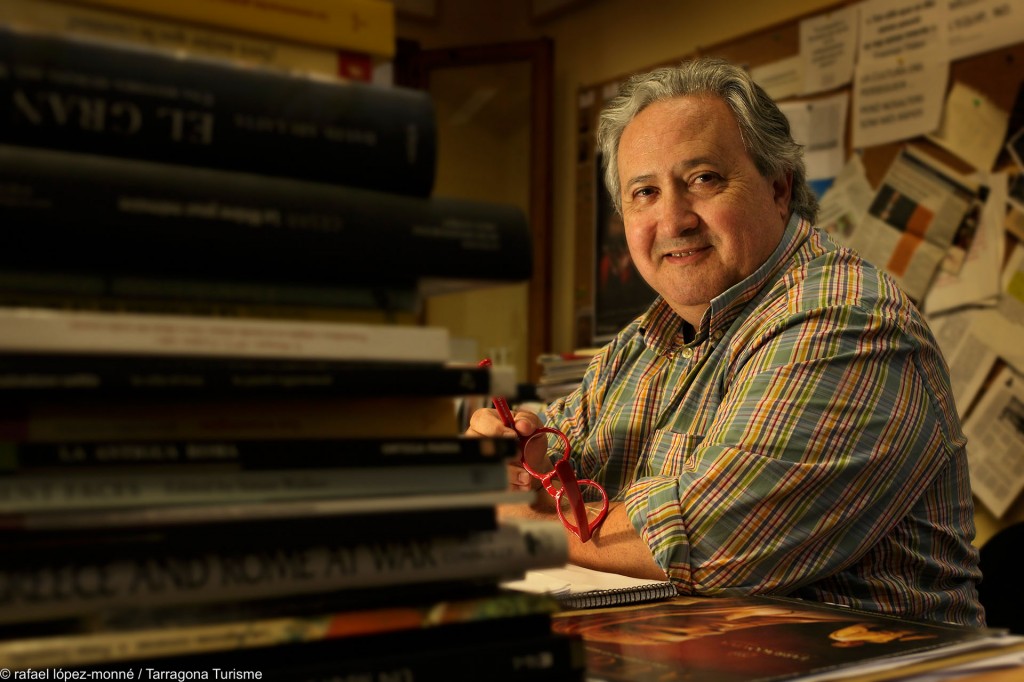Seneca used to say that wisdom is the only freedom. Magí Seritjol began to grow it as a child by almost literally eating up pages of history books in the library; and he still is these days, right in the digital era, always learning, absorbing information and, mostly, sharing it with others. Tarraco Viva, the festival he manages, works as a huge social network at the service of a history dissemination and thinking. Culture, when generously shared, multiplies its transforming effect. “And it is as necessary as our daily food”, says Seritjol.
Honesty, ability to explain the facts without feeling ashamed, simplicity in the delivery, capacity to engage with the audience… With all due caution, Tarraco Viva is to history as John Ford was to cinema: a clear narrative style, with no additives, about the virtues and flaws that define us as human beings. In the same way as The Searchers (1956), a classic among the classics, the Roman festival tells us about a non-stopping search that raises new questions as it goes. The story of a necessity: to find out who we are.
With over 2,000 years of history –but also, of stories–, Tarragona is one of the best places to find out what we are made of. The harbour, working since the Roman period, has seen an endless flow of goods, ideas and values that have left a trace in the city. One can see the essence of a varied and shared Mediterranean Sea in the people’s character, the core of what has been the cradle of many civilizations for thousands of years. To Magí Seritjol, son of a Serrallo neighbourhood’s fishing family, the so-called “Mare Nostrum” has also been an inexhaustible source of both food and experiences; the background for a Tarraco Viva festival that can be understood, mostly, by getting to know the passion felt in the city for the glories of yesteryear.
Also, the qualities of that who founded the festival in 1999 and has been its leader ever since, in every of the seventeen editions held until now. As the history expert he is, Seritjol worked professionally for most part of the 80s in the performing arts as both a scriptwriter and management assistant, and he even worked as director in one of the editions of the popular Fira del Teatre (Theatre Fair) of Tàrrega. In the 90s, he joined the Tarragona History Museum as a technician, and started to work in much more than just mere exhibitions, with the intention of connecting with a more diverse public. “The conservation and scientific research make no sense unless we spread it in a properly adapted way”, he states.
Tarraco Viva was born from the symbiosis of two apparently distant disciplines: the performing arts and the search of a new state of recognition for Tarragona’s Roman heritage. Inspired in the greatest re-enactment festivals, typically Anglo-Saxon, this festival held in Tarragona has found the perfect formula. The proposal includes not just rigorous dramatized reconstructions on a daily basis in Rome, but also exhibitions, guided tours, conferences, gastronomy demonstrations, workshops and cinema, which mobilize over 1,000 people and work as the perfect showcase for Tarragona. Last year, it gathered over 123,000 spectators.
“I’ve connected my two passions thanks to the festival: history and cultural management. We’ve cemented a single thread, every edition is a whole new challenge, and I am more excited now than I was in the beginning”, says Seritjol. Tarraco Viva makes the most of not just the city’s incredible Roman legacy; it has built up a pretty remarkable network of international collaborators that position Tarragona as a cultural city, and it has been able to take advantage of the close location of scientific institutions such as the URV (Universitat Rovira i Virgili) or the Institut Català d’Investigació Clàssica (Catalan Institute of Classical Investigation). The economic consideration and activities carried out by the city’s patrimony has multiplied, and this has lead to the local historical reconstruction groups born out of the festival to evolve in what their experience is concerned, which has made it possible for the Tarragona trademark to be exported to other cultural events.
Besides Tarraco Viva, the main idea is to build a kind of industry that spreads Tarragona’s history, together with the growing cultural offer of the city. The purpose is to provide activity that will therefore generate a profit, which can then be used, among others, to preserve, research and broadcast History; that is, to develop a sustainable virtuous circle.
By implementing a quality product, useful to society, the festival has proved that culture can really become a sustainable public service: for every Euro invested, it produces 8€ of profit. The most important thing though is the substance and not the form, Seritjol insists. “We must know where we want to go, be awake, by putting the ideas and projects at its disposal; not the opposite”, he finishes.




